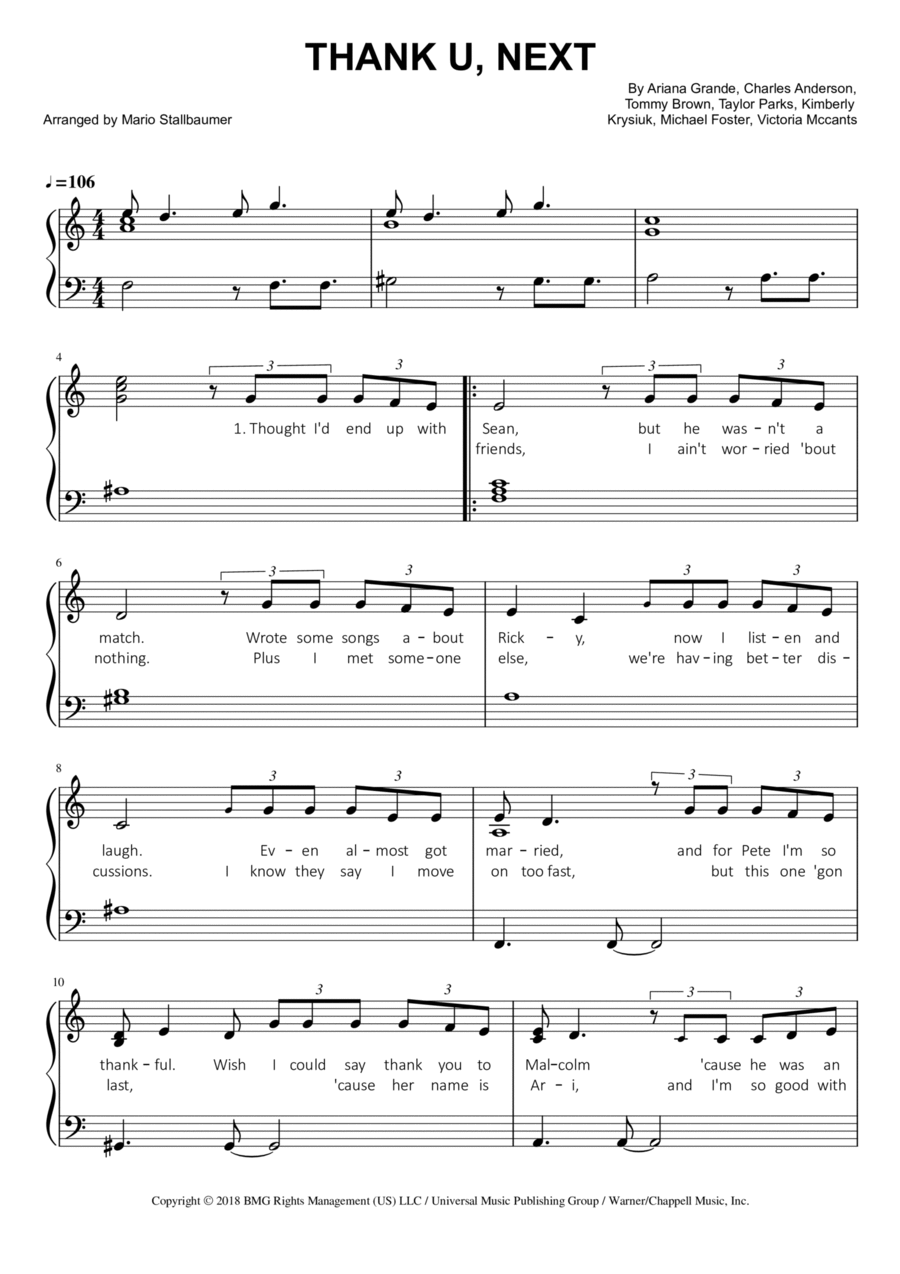Piano,Vocal,Voice - Level 2 - Digital Download SKU: A0.510526 By Ariana Grande. By Ariana Grande, Charles Anderson, Kimberly Krysiuk, Michael Foster, Tayla Parx, Taylor Parks, Tommy Brown, and Victoria McCants. Arranged by Mario Stallbaumer. Pop. Score. 5 pages. Mario Stallbaumer #4301505. Published by Mario Stallbaumer (A0.510526). Here‚Äôs how to play ‚Äúthank u, next‚ÄĚ by Ariana Grande on piano!With this piano sheet music, you can play ‚Äúthank u, next‚ÄĚ on piano - you can use it as an instrumental arrangement, but also accompany singers, or sing along yourself.This ‚Äúthank u, next‚ÄĚ piano version is transposed one half step from the original key of Bb minor to A minor, so it‚Äôs much easier to play. These piano sheets come with all parts of the song, full lyrics included. It‚Äôs not too hard to play and sounds fantastic!However, there‚Äôs a more challenging arrangement of the song in the original key available, you can get it here: https://www.sheetmusicplus.com/title/21155619Ariana Grande certainly knows what it's like if one's personal life is making headlines. In November 2018, she released thank u, next, a surprisingly positive song about her past relationships and breakups (including Mac Miller, Pete Davidson and Big Sean), in which she comes to the conclusion that she learned from all of them!‚Äúthank u, next‚ÄĚ serves as the lead single from Ariana Grande‚Äôs fifth studio album. Here are the song‚Äôs full lyrics:‚ÄúThought I'd end up with SeanBut he wasn't a matchWrote some songs about RickyNow I listen and laughEven almost got marriedAnd for Pete, I'm so thankfulWish I could say, Thank you to Malcolm'Cause he was an angelOne taught me loveOne taught me patienceAnd one taught me painNow, I'm so amazingI've loved and I've lostBut that's not what I seeSo, look what I gotLook what you taught meAnd for that, I sayThank you, next (next)Thank you, next (next)Thank you, nextI'm so fuckin' grateful for my exThank you, next (next)Thank you, next (next)Thank you, next (next)I'm so fuckin'Spend more time with my friendsI ain't worried 'bout nothin'Plus, I met someone elseWe havin' better discussionsI know they say I move on too fastBut this one gon' last'Cause her name is AriAnd I'm so good with that (so good with that)She taught me love (love)She taught me patience (patience)How she handles pain (pain)That shit's amazing (yeah, she's amazing)I've loved and I've lost (yeah, yeah)But that's not what I see (yeah, yeah)'Cause look what I've found (yeah, yeah)Ain't no need for searching, and for that, I sayThank you, next (thank you, next)Thank you, next (thank you, next)Thank you, next (thank you)I'm so fuckin' grateful for my exThank you, next (thank you, next)Thank you, next (said thank you, next)Thank you, next (next)I'm so fuckin' grateful for my exThank you, nextThank you, nextThank you, nextI'm so fuckingOne day I'll walk down the aisleHolding hands with my mamaI'll be thanking my dad'Cause she grew from the dramaOnly wanna do it once, real badGon' make that shit lastGod forbid something happensLeast this song is a smash (song is a smash)I've got so much love (love)Got so much patience (patience)I've learned from the pain (pain)I turned out amazing (turned out amazing)I've loved and I've lost (yeah, yeah)But that's not what I see (yeah, yeah)'Cause look what I've found (yeah, yeah)Ain't no need for searchingAnd for that, I'll sayThank you, next (thank you, next)Thank you, next (thank you, next)Thank you, nextI'm so fuckin' grateful for my exThank you, next (thank you, next)Thank you, next (said thank you, next)Thank you, next (next)I'm.
